God and the Pandemic Lesson 2

Welcome back to class.
We are going to review a very recent book by N. T. Wright titled “God and the Pandemic”.
The Subtitle is appropriate also: “A Christian Reflection on the Coronavirus and its Aftermath”.
If you have read any of Wright’s books you might find this one unusual – it is about 90 pages long. I will explain why that is shortly.
But if you read any of his books you will find I think that it is typically Wright. He always brings new insights and thinking into his writing, especially relative to interpreting biblical scripture.
I was also glad it was a short book– because as much as I enjoy studying Wright – I find all of his books to be tough to read. I will explain that as we go also.

A Very Brief Review
OK – let’s begin with a very brief review of what we covered last week.
N. T. Wright was asked by Time Magazine to write a short piece related to religious responses to the pandemic gripping the world. And in doing that he eventually decided to expand on that with this relatively short book called “God and the Pandemic”.
And last week we began to set this “book review” up with quite a bit of background material and explanations of what Wright decided to emphasize.
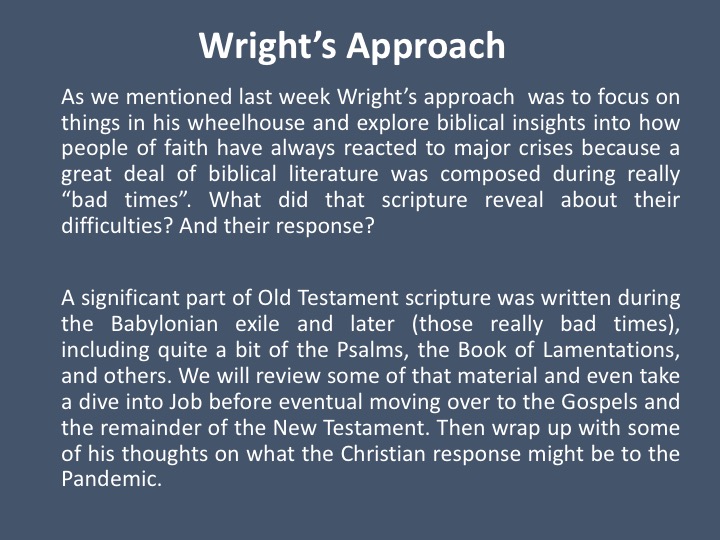
Wright’s Approach
As we mentioned last week Wright’s approach was to focus on things in his his wheelhouse and explore biblical insights into how people of faith have always reacted to major crises because a great deal of biblical literature was composed during really “bad times”. What did that scripture reveal about their difficulties? And their response?
A significant part of Old Testament scripture was written during the Babylonian exile and later (those really bad times), including quite a bit of the Psalms, the Book of Lamentations, and others. We will review some of that material and even take a dive into Job before eventual moving over to the Gospels and the remainder of the New Testament. Then wrap up with some of his thoughts on what the Christian response might be to the Pandemic.
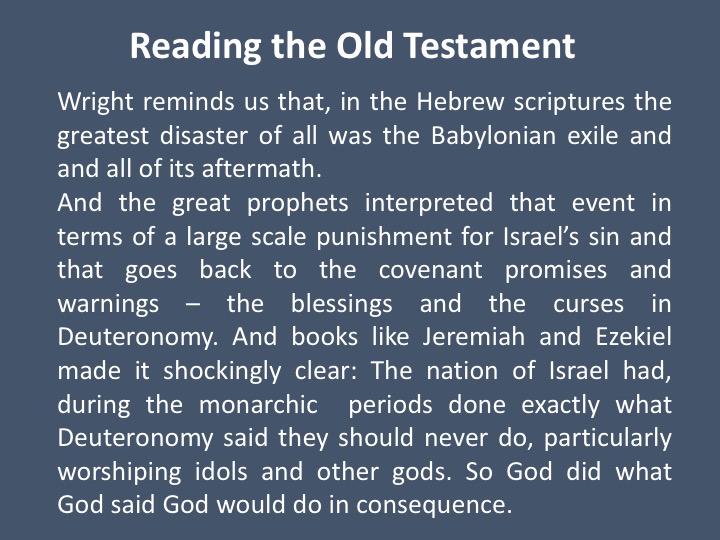
Reading the Old Testament
Wright reminds us that, in the Hebrew scriptures the greatest disaster of all was the Babylonian exile and and all of its aftermath.
And the great prophets interpreted that event in terms of a large-scale punishment for Israel’s sin and that goes back to the covenant promises and warnings – the blessings and the curses in Deuteronomy. And books like Jeremiah and Ezekiel made it shockingly clear: The nation of Israel had, during the monarchic periods exactly what Deuteronomy said they should never do, particularly worshiping idols and gods. So God did what God said God would do in consequence.
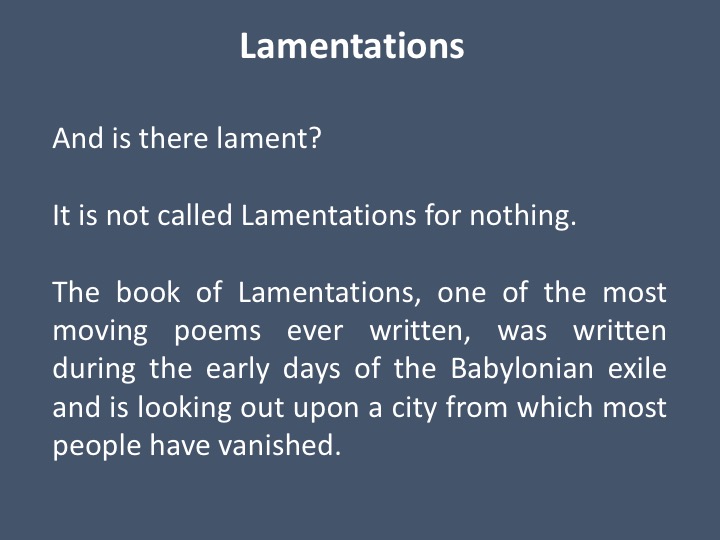
Lamentations
The book of Lamentations, one of the most moving poems ever written, was written during the early days of the Babylonian exile and is looking out upon a city from which most people have vanished.
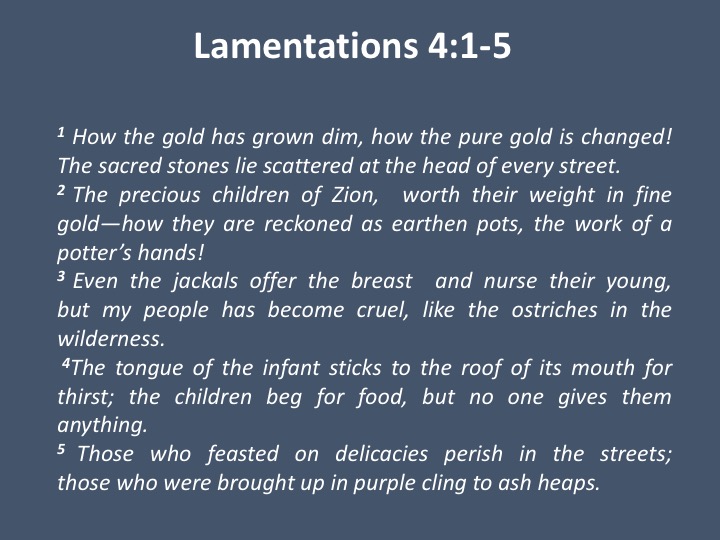
Lamentations 4:1-5
1 How
the gold has grown dim, how the pure gold is changed!
The sacred stones lie scattered at the head of every street.
2 The precious children of Zion, worth their weight in fine gold—how they are reckoned as earthen pots, the work of a potter’s hands!
3 Even
the jackals offer the breast and nurse their young,
but my people has become cruel, like the ostriches in the wilderness.
4The tongue of the infant sticks to the roof of its mouth for thirst; the children beg for food, but no one gives them anything.
5 Those
who feasted on delicacies perish in the streets;
those who were brought up in purple cling to ash heaps.
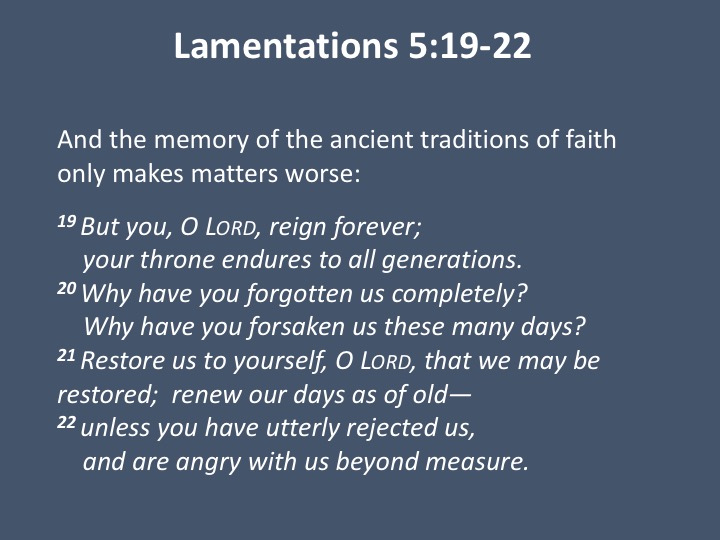
Lamentations 5:19-22
And the memory of the ancient traditions of faith only makes matters worse:
19 But
you, O Lord, reign
forever;
your throne endures to all generations.
20 Why
have you forgotten us completely?
Why have you forsaken us these many days?
21 Restore
us to yourself, O Lord, that we may be
restored;
renew our days as of old -
22 unless
you have utterly rejected us,
and are angry with us beyond measure.
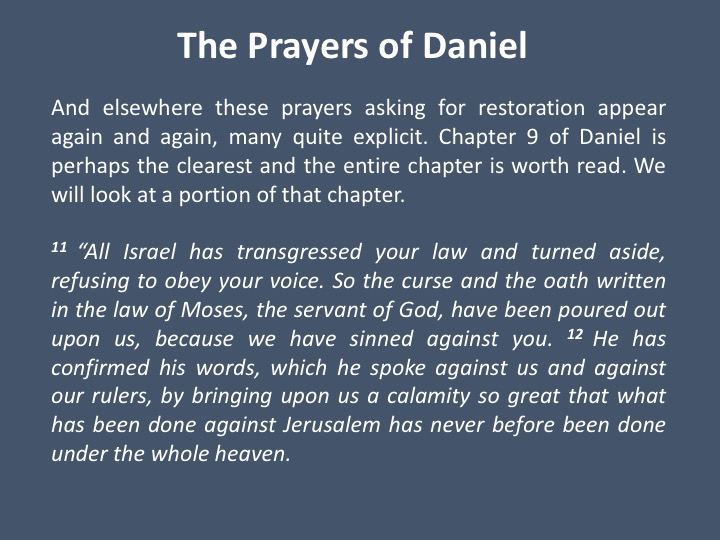
The Prayers of Daniel
And elsewhere these prayers asking for restoration appear again and again, many quite explicit. Chapter 9 of Daniel is perhaps the clearest and the entire chapter is worth read. is worth a read.
11 “All Israel has transgressed your law and turned aside, refusing to obey your voice. So the curse and the oath written in the law of Moses, the servant of God, have been poured out upon us, because we have sinned against you. 12 He has confirmed his words, which he spoke against us and against our rulers, by bringing upon us a calamity so great that what has been done against Jerusalem has never before been done under the whole heaven.
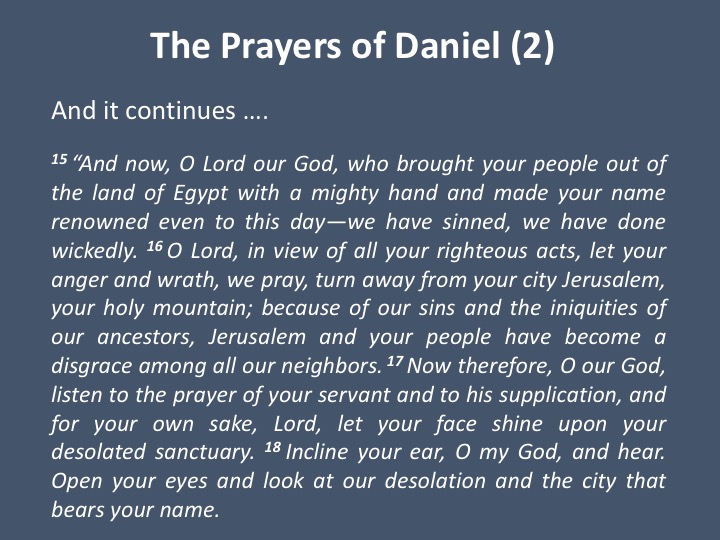
The Prayers of Daniel
And it continues ….
15 “And now, O Lord our God, who brought your people out of the land of Egypt with a mighty hand and made your name renowned even to this day - we have sinned, we have done wickedly. 16 O Lord, in view of all your righteous acts, let your anger and wrath, we pray, turn away from your city Jerusalem, your holy mountain; because of our sins and the iniquities of our ancestors, Jerusalem and your people have become a disgrace among all our neighbors. 17 Now therefore, O our God, listen to the prayer of your servant and to his supplication, and for your own sake, Lord,[b] let your face shine upon your desolated sanctuary. 18 Incline your ear, O my God, and hear. Open your eyes and look at our desolation and the city that bears your name.
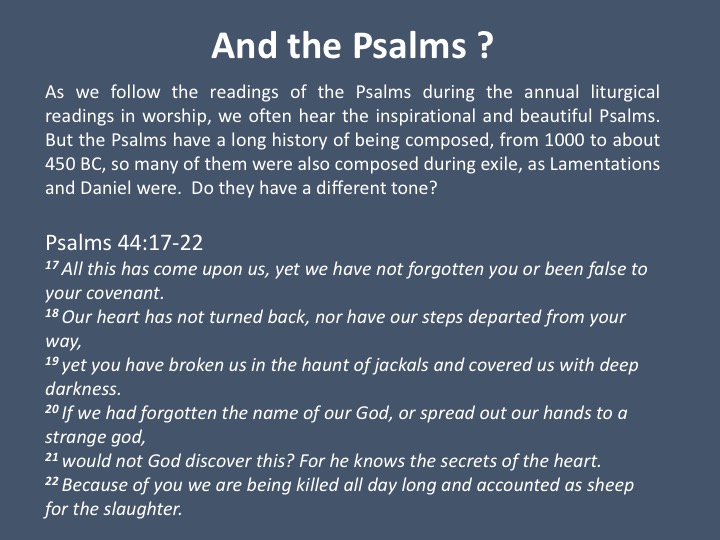
And the Psalms ?
As we follow the readings of the Psalms during the annual liturgical readings in worship, we often hear the inspirational and beautiful Psalms. But the Psalms have a long history of being composed, from 1000 to about 450 BC, so many of them were also composed during exile, as Lamentations and Daniel were. Do they have a different tone?
Psalms 44:17-22
17 All this has come upon us
yet we have not forgotten you or been false to your covenant.
18 Our
heart has not turned back, nor have our steps departed from your
way,
19 yet
you have broken us in the haunt of jackals and covered us with deep darkness.
20 If we had forgotten the name of our God, or spread out our hands to a strange god,
21 would not God discover
this? For he knows the secrets of the heart.
22 Because
of you we are being killed all day long and accounted as sheep for the
slaughter.
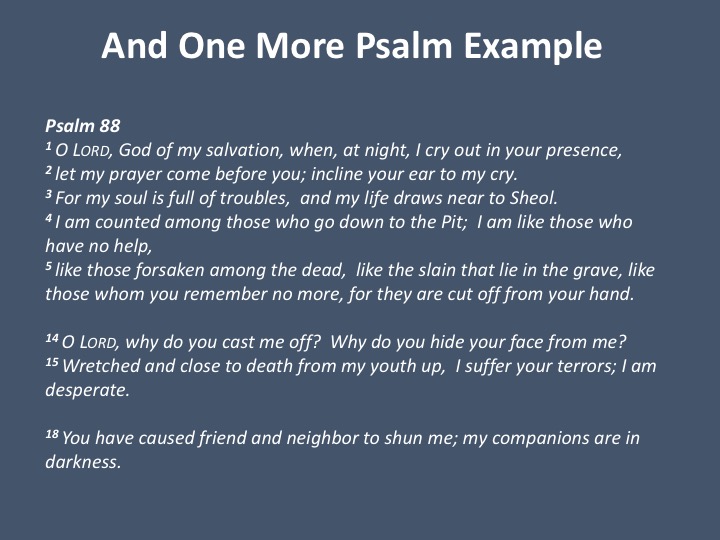
And One More Psalm Example
Psalm 88
1 O Lord, God of my salvation, when, at night, I
cry out in your presence,
2 let
my prayer come before you; incline your ear to my cry.
3 For
my soul is full of troubles, and my life draws near to Sheol.
4 I am
counted among those who go down to the Pit; I am like those who have
no help,
5 like
those forsaken among the dead, like the slain that lie in the grave,
like those whom you remember no more, for they are cut off from your
hand.
14 O Lord, why do you cast me off? Why
do you hide your face from me?
15 Wretched
and close to death from my youth up, I suffer your terrors; I am
desperate.
16 Your
wrath has swept over me; your dread assaults destroy me.
17 They
surround me like a flood all day long; from all sides they close in on
me.
18 You
have caused friend and neighbor to shun me; my companions are in darkness.
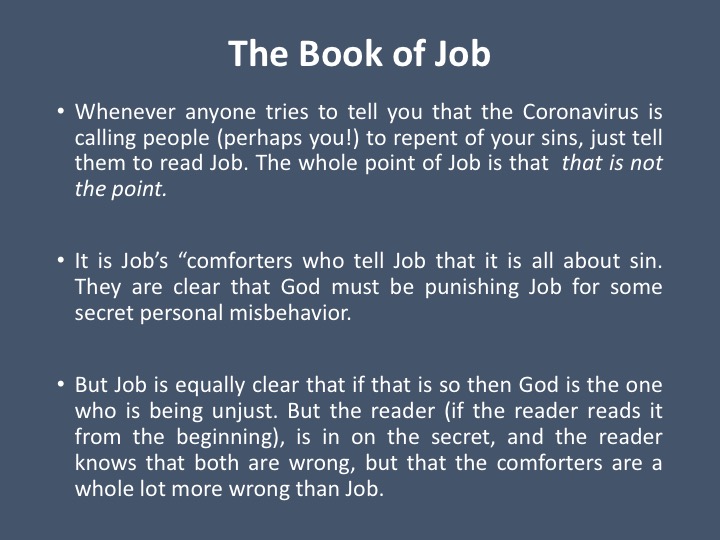
The Book of Job
Whenever anyone tries to tell you that the Coronavirus is calling people (perhaps you!) to repent of your sins, just tell them to read Job. The whole point of Job is that that is not the point.
It is Job’s “comforters who tell Job that it is all about sin. They are clear that God must be punishing Job for some secret personal misbehavior.
But Job is equally clear that if that is so then God is the one who is being unjust. But the reader (if the reader reads it from the beginning), is in on the secret, and the reader knows that both are wrong, but that the comforters are a whole lot more wrong than Job.
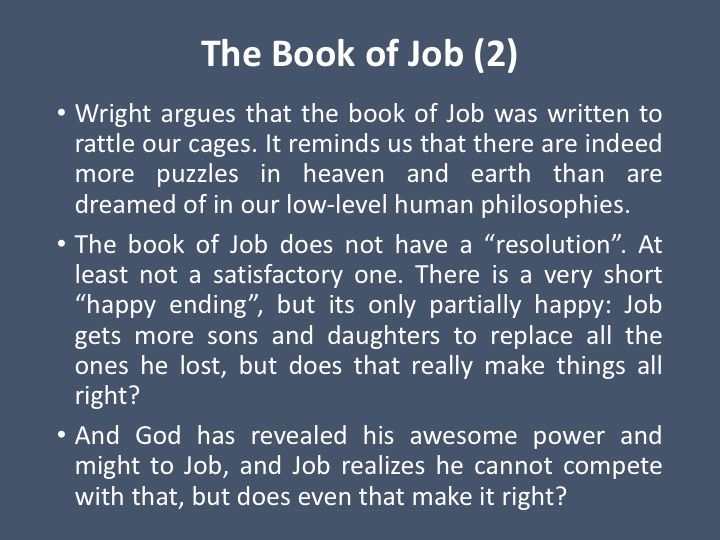
The Book of Job
Wright argues that the book of Job was written to rattle our cages. It reminds us that there are indeed more things (and puzzles) in heaven and earth than are dreamed of in our low-level human philosophies.
The book of Job does not have a “resolution”. At least not a satisfactory one. There is a very short “happy ending”, but its only partially happy: Job gets more sons and daughters to replace all the ones he lost, but does that really make things all right?
And God has revealed his awesome power and might to Job, and Job realizes he cannot compete with that, but does even that make it right?
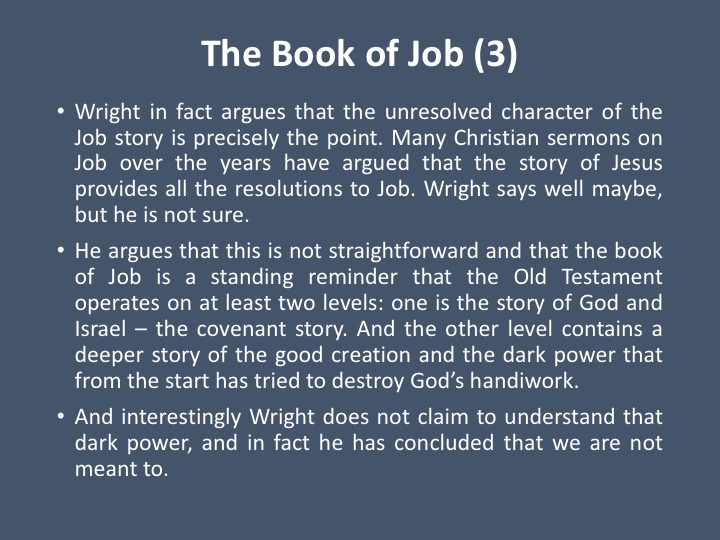
The Book of Job (3)
Wright in fact argues that the unresolved character of the Job story is precisely the point. Many Christian sermons on Job over the years have argued that the story of Jesus provides all the resolutions to Job. Wright says well maybe, but he is not so sure.
He argues that this is not straightforward and that the book of Job is a standing reminder that the Old Testament operates on at least two levels: one is the story of God and Israel – the covenant story. And the other level contains a deeper story of the good creation and the dark power that from the start has tried to destroy God’s handiwork.
And interestingly Wright does not claim to understand that dark power, and in fact he has concluded that we are not meant to.
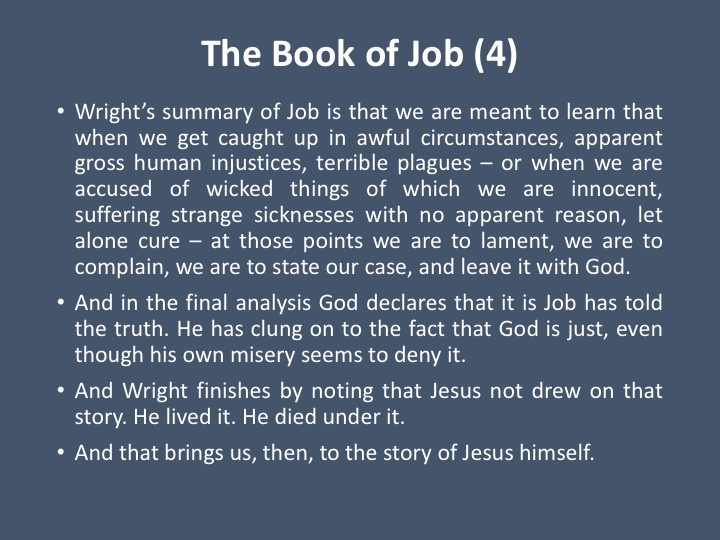
The Book of Job (3)
Wright’s summary of Job is that we are meant to learn that when we get caught up in awful circumstances, apparent gross human injustices, terrible plagues – or when we are accused of wicked things of which we are innocent, suffering strange sicknesses with no apparent reason, let alone. Cure – at those points we are to lament, we are to complain, we are to state our case, and leave it with God.
And in the final analysis God declares that it is Job has told the truth. He has clung on to the fact that God is just, even though his own misery seems to deny it.
And Wright finishes by noting that Jesus not only drew on that story. He lived it. He died under it.
And that brings us, then, to the story of Jesus himself.
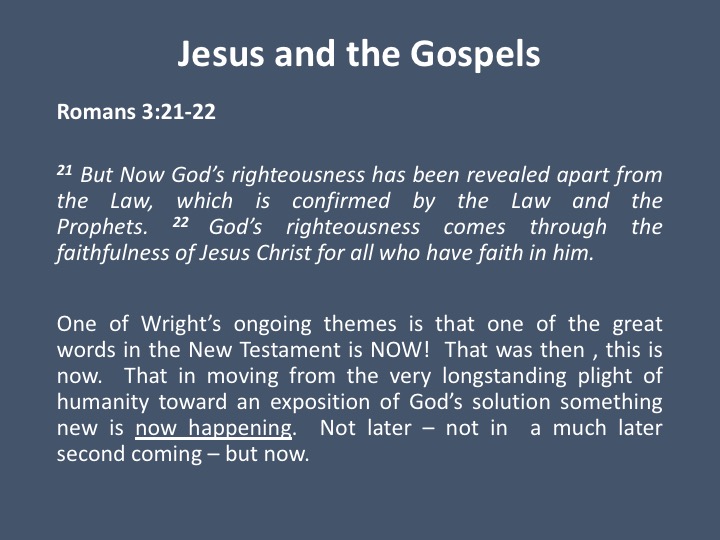
Jesus and the Gospels
21 But now God’s righteousness has been revealed apart from the Law, which is confirmed by the Law and the Prophets. 22 God’s righteousness comes through the faithfulness of Jesus Christ for all who have faith in him.
One of Wright’s ongoing themes is that one of the great words in the New Testament is NOW! That was then , this is now. That in moving from the very longstanding plight of the Israelites toward an exposition of God’s solution something new is now happening. Not later – not in a much later second coming – but now.
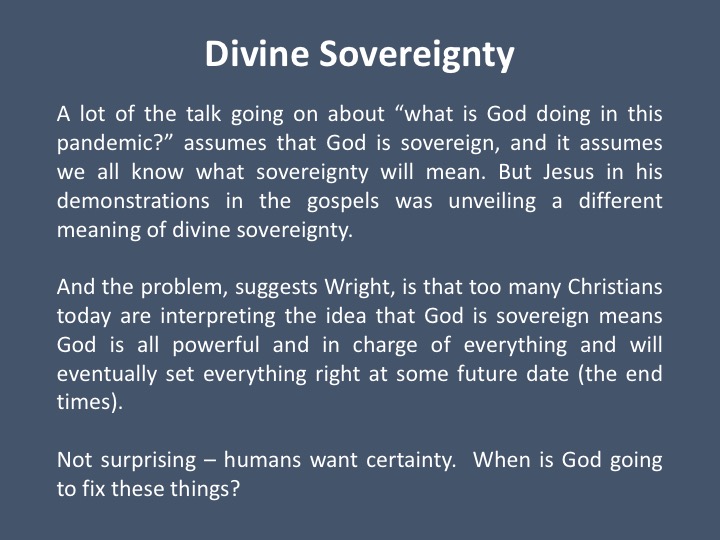
Divine Sovereignty
A lot of the talk going on about “what is God doing in this pandemic” assumes that God is sovereign, and it assumes we all know what sovereignty will mean. But Jesus in his demonstrations in the gospels was unveiling a different meaning of divine sovereignty.
And the problem, suggests Wright, is that too many Christians today are interpreting the idea that God is sovereign means God is all powerful and in charge of everything and will eventually set everything right at some future date (the end times).
Not surprising – humans want certainty. When is God going to fix these things?
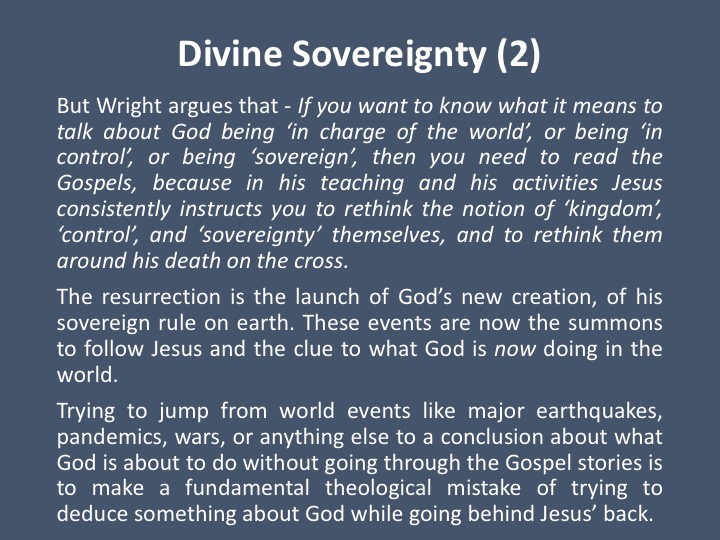
Divine Sovereignty (2)
But Wright argues that - If you want to know what it means to talk about God being ‘in charge of the world’, or being ‘in control’, or being ‘sovereign’, then you need to read the Gospels, because in his teaching and his activities Jesus consistently instructs you to rethink the notion of ‘kingdom’, ‘control’, and ‘sovereignty’ themselves, and to rethink them around his death on the cross.
The resurrection is the launch of God’s new creation, of his sovereign rule on earth. These events are now the summons to follow Jesus and the clue to what God is now doing in the world.
Trying to jump from world events like major earthquakes, pandemics, wars, or anything else to a conclusion about what God is about to do without going through the Gospel stories is to make a fundamental theological mistake of trying to deduce something about God while going behind Jesus’ back.
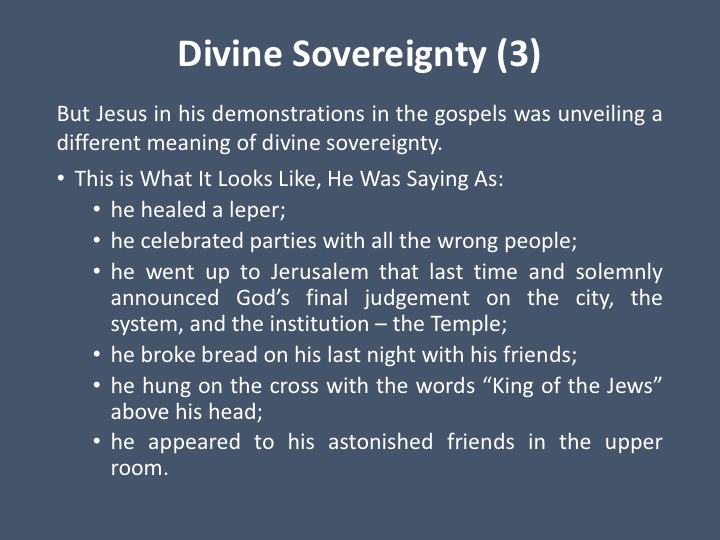
Divine Sovereignty (3)
But Jesus in his demonstrations in the gospels was unveiling a different meaning of divine sovereignty.
This is What It Looks Like, He Was Saying As:
he healed a leper;
he celebrated parties with all the wrong people;
he went up to Jerusalem that last time and solemnly announced God’s final judgement on the city, the system, and the institution – the Temple;
he broke bread on his last night with his friends;
he hung on the cross with the words “King of the Jews” above his head;
he appeared to his astonished friends in the upper room.
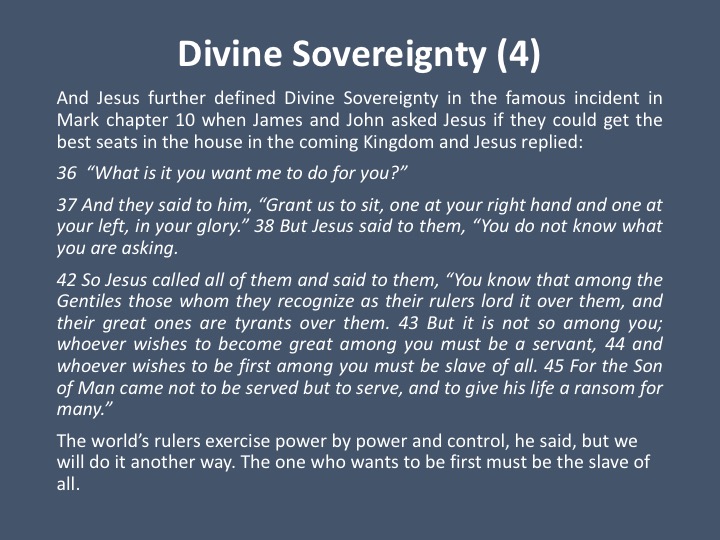
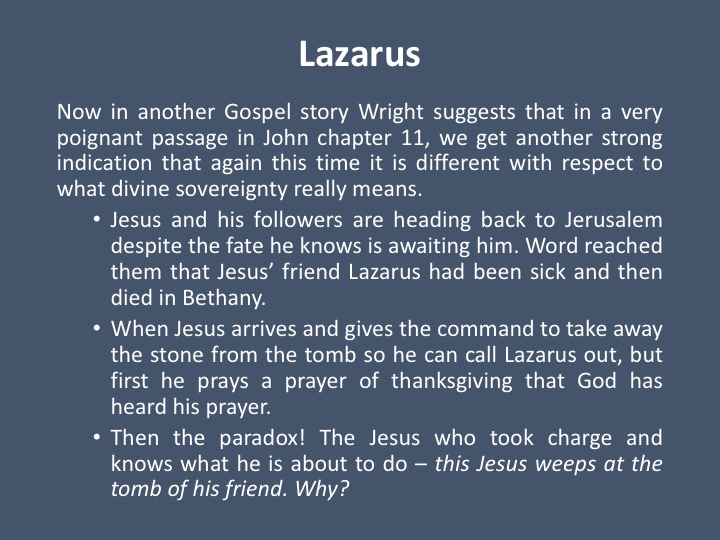
Lazarus
Now in another Gospel story Wright suggests that in a very poignant passage in John chapter 11, we get another strong indication that again this time it is different with respect to what does sovereignty really means.
Jesus and his followers are heading back to Jerusalem despite the fate he knows is awaiting him. Word reached them that Jesus’ friend Lazarus had been sick and then died in Bethany.
When Jesus arrives and gives the command to take away the stone from the tomb so he can call Lazarus out., but first he prays a prayer of thanksgiving that God has heard his prayer.
Then the paradox! The Jesus who took charge and knows what he is about to do – this Jesus weeps at the tomb of his friend. Why?
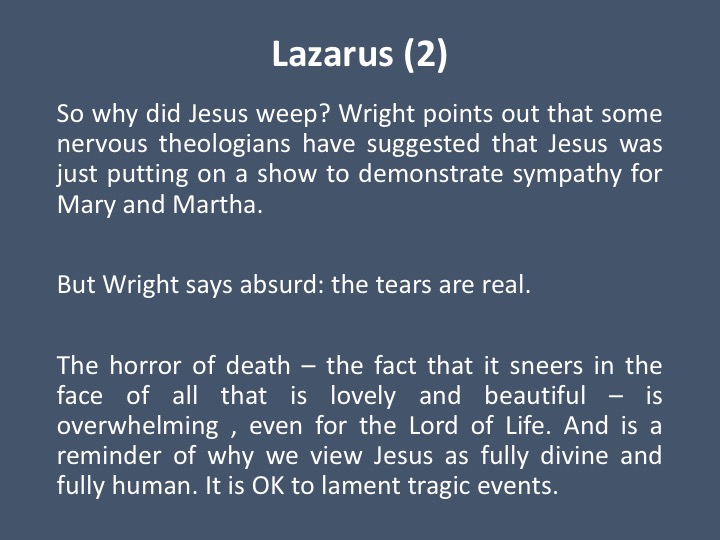
Lazarus (2)
So why did Jesus weep? Wright points out that some nervous theologians have suggested that Jesus was just putting on a show to demonstrate sympathy for Mary and Martha.
But Wright says No: the tears are real.
The horror of death – the fact that it sneers in the face of all that is lovely and beautiful – is overwhelming , even for the Lord of Life. And is a reminder of why we view Jesus as fully divine and fully human. It is OK to lament tragic events.
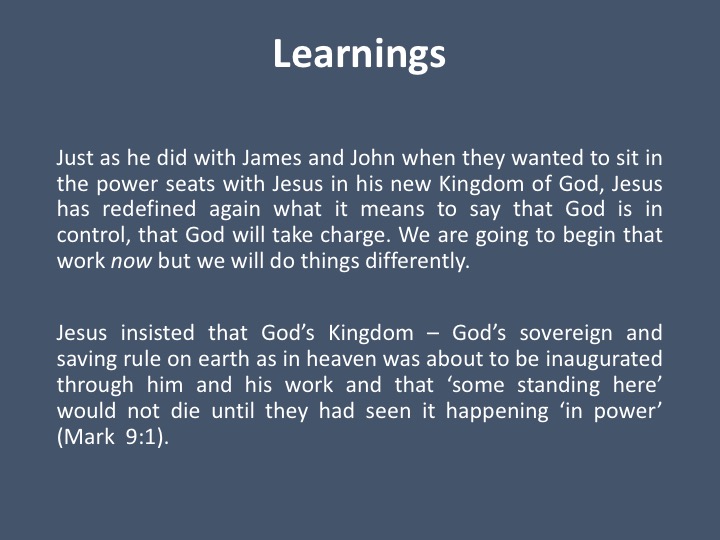
Lazarus (3)
Just as he did with James and John when they wanted to sit in the power seats with Jesus in his new Kingdom of God, Jesus has redefined again what it means to say that God is in control, that God will take charge. We are going to do things differently.
Jesus insisted that God’s Kingdom – God’s sovereign and saving rule on earth as in heaven was about to be inaugurated through him and his work and that ‘some standing here’ would not die until they had seen it happening ‘in power’ (Mark 9:1)
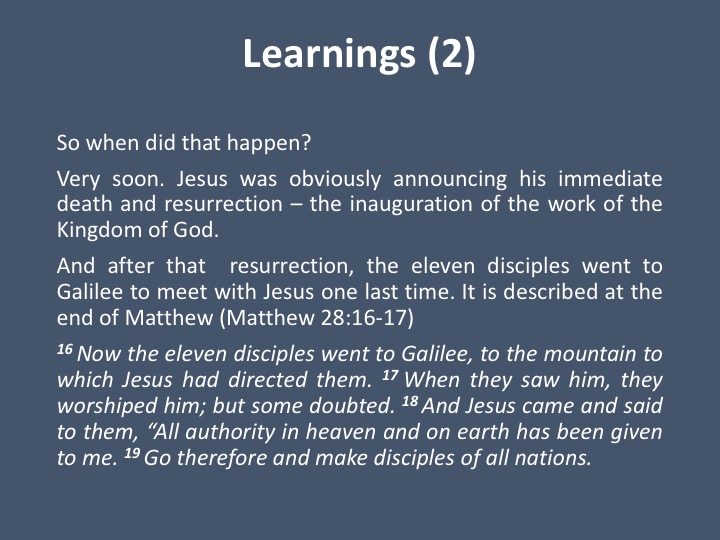
Learnings (2)
So when did that happen?
Very soon. Jesus was obviously announcing his immediate death and resurrection – the inauguration of the work of the Kingdom of God.
And after that resurrection, the eleven disciples went to Galilee to meet with Jesus one last time. It is described at the end of Matthew (Matthew 28:16-17)
16 Now the eleven disciples went to Galilee, to the mountain to which Jesus had directed them. 17 When they saw him, they worshiped him; but some doubted. 18 And Jesus came and said to them, “All authority in heaven and on earth has been given to me. 19 Go therefore and make disciples of all nations.
Notice that Jesus did not say that all authority will be given to me - but has been given to me. Now
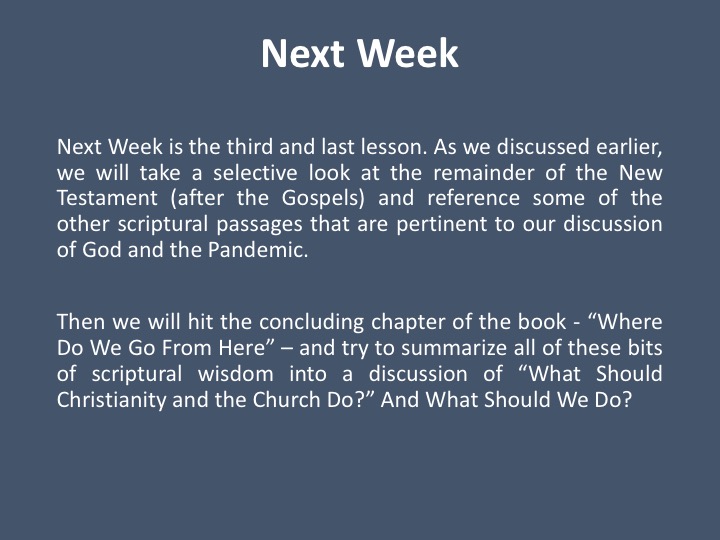
Next Week
Next Week is the third and last lesson. As we discussed earlier, we will take a selective look at the remainder of the New Testament (after the Gospels) and reference some of the other scriptural passages that are pertinent to our discussion of God and the Pandemic.
Then we will hit the concluding chapter of the book - “Where Do We Go From Here” – and try to summarize all of these bits of scriptural wisdom into a discussion of “What Should Christianity and the Church Do?” And What Should We Do?